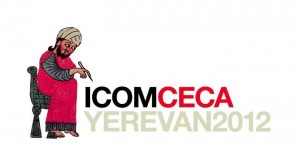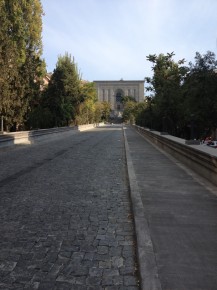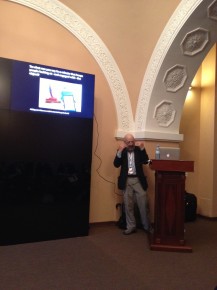ICOM CECA 2012 #1
 After a pre-conference day with workshops and opening ceremonies, today was the official first conference day of ICOM CECA 2012 at Yerevan, Armenia. Theme this year is “Museums and written communication; Tradition and innovation”. My presence here this week is because of the increasing use of new media within our curriculum at the Reinwardt Academy, new media not only as a subject manner but also as a tool. This conference kind of offers the same duality.
After a pre-conference day with workshops and opening ceremonies, today was the official first conference day of ICOM CECA 2012 at Yerevan, Armenia. Theme this year is “Museums and written communication; Tradition and innovation”. My presence here this week is because of the increasing use of new media within our curriculum at the Reinwardt Academy, new media not only as a subject manner but also as a tool. This conference kind of offers the same duality.
The conference was opened by no less than the Minister of Culture of the Republic of Armenia, the President of ICOM, the president of the CECA committee, the director of the hosting museum (museum-institute of ancient manuscripts after mesrop mashtots ‘matenadaran’) and Ani Avagyan, the coordinator of the totality of the conference. I must say: say did (en does) a great job in coordinating all and it has been a pleasure getting her acquaintance. Unfortunately arriving at Yerevan at 4.00 in the morning made me miss her opening speech in which she collaborated on the evolution and actual state of education within the Armenian museums. From what I heard things are going well and developments are progressing in the right direction.
 The first keynote speaker, Hripsime Pikichyan from the Yerevan State University, gave her insight on the conference theme by deliberating on “the writing and the book in the museum context”. Catherine Guillou from the Louvre took the microphone to share with us some theories on a renewed mediation in the Louvre. She reflected on the question how to propose a “demanding simplification popularization”. Unfortunately she chose not to speak in English so most of the participant missed out on most of her reflecting issues.
The first keynote speaker, Hripsime Pikichyan from the Yerevan State University, gave her insight on the conference theme by deliberating on “the writing and the book in the museum context”. Catherine Guillou from the Louvre took the microphone to share with us some theories on a renewed mediation in the Louvre. She reflected on the question how to propose a “demanding simplification popularization”. Unfortunately she chose not to speak in English so most of the participant missed out on most of her reflecting issues.
After a perfect lunch providing a mix of Armenian and Mediterranean food we had the pleasure of two speakers telling us about their on-going research on the field of museum education. First up was Michel Allard form the University of Quebec at Montreal who share a glimpse of the history of museum education worldwide. In his perception we could define our way of museum mediation by comparing it with the museological approach of the museum object. Jean-Christophe Vilatte and Hana Gottesdiener from the university of Avignon talked about their study in which they a working toward a toolkit (activity kit) for image education. The important question in this research of course was weather a game is just a game or also a learning process.
 We ended this day with two parallel sessions. Alison and Roger Heath opened the ‘thematically session’ by telling us about their work in Botswana in which the try to make information about the vegetation in Botswana visible and accessible to ordinary people. The collect information of plants and describe them into a database which helps to maintain the knowledge not only on what these plants are but also on what the communities use(d) them for. Peter Samis from the San Francisco Museum of Art enthusiastically shared his opinion on how we could and should handle visitor texts in our exhibitions by showing some best practices and his point of view of what he calls the well of language: famines, floods and flows of meaning. Closing speech was made by Li Wang from the China Shaanxi History Museum in Japan. She had recently finished her study on the use of social media at museums and told about her essay, titled ‘Museum 2.0, an extended museum exhibition at the Cyber Space.’ In her research she gathered visions on the use of social media from the leading parties in this matter and concluded that for most curators and also for ICOM CECA there are some issues left unrevealed. Not the newest of information, but, as she already concluded, unknown territory for a part of the participants.
We ended this day with two parallel sessions. Alison and Roger Heath opened the ‘thematically session’ by telling us about their work in Botswana in which the try to make information about the vegetation in Botswana visible and accessible to ordinary people. The collect information of plants and describe them into a database which helps to maintain the knowledge not only on what these plants are but also on what the communities use(d) them for. Peter Samis from the San Francisco Museum of Art enthusiastically shared his opinion on how we could and should handle visitor texts in our exhibitions by showing some best practices and his point of view of what he calls the well of language: famines, floods and flows of meaning. Closing speech was made by Li Wang from the China Shaanxi History Museum in Japan. She had recently finished her study on the use of social media at museums and told about her essay, titled ‘Museum 2.0, an extended museum exhibition at the Cyber Space.’ In her research she gathered visions on the use of social media from the leading parties in this matter and concluded that for most curators and also for ICOM CECA there are some issues left unrevealed. Not the newest of information, but, as she already concluded, unknown territory for a part of the participants.
I am looking forward at tomorrow where Theo Meereboer and John Reeve will provide us with their key note speeches and let us have a peak at their vision of the role of museums education and –communication in the future. I expect them to provide us with extra thoughts and show us the needed steps towards innovation. And of course a report of all that will be published here at Erfgoed 2.0.
